If Dawood Ibrahim's syndicate consolidate its numero uno status, it also saw Mumbai police hit back with a vengeance. Senior journalist S Hussain Zaidi decodes the Mumbai underworld in the 1990s
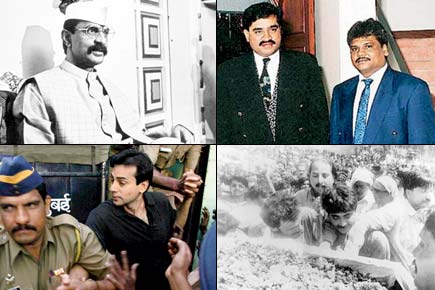
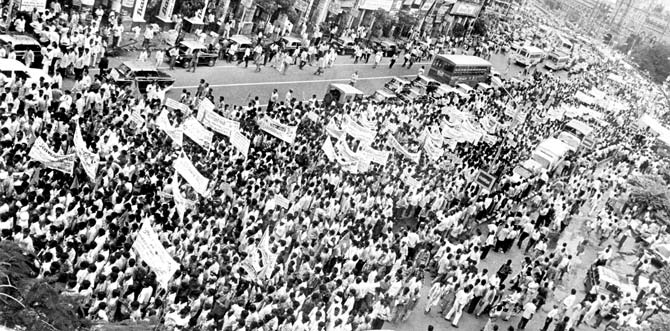
In the late '90s, when Arun Gawli led a political rally in Kala Ghoda, over 1.5 lakh participants turned up, making the 'dark horse' in the Mafioso a force to reckon with
 On October 8, 1998, the owner of Roopam Stores at Crawford Market was shot and killed right across the road from the police commissioner's office. In a way, Bharat Shah's murder was the game changer for the rampaging Mumbai mafia.
On October 8, 1998, the owner of Roopam Stores at Crawford Market was shot and killed right across the road from the police commissioner's office. In a way, Bharat Shah's murder was the game changer for the rampaging Mumbai mafia.
The message was loud and clear. Don't mess with the D gang. The Dawood Ibrahim syndicate had consolidated its numero uno status in the '90s, the several high-profile murders it was linked to being a lesson for moneybags in Mumbai. What Dawood's men did not anticipate was the growing power of another lethal syndicate, the P gang. This one had the backing of the state administration. The P gang's retaliation finally rid the city of the mafia stranglehold.
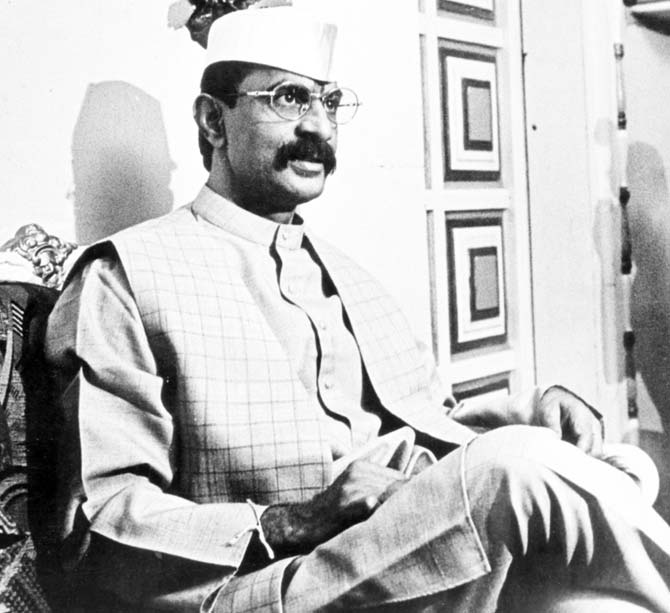
Arun Gawli
As I chronicled the genesis of the mafia in my book Dongri to Dubai, the first batch of gangs I focused on was a rag-tag bunch of uneducated boys and young men who grouped in accordance with their place of origin. Most of them were from Uttar Pradesh - so, there were the Jaunpuri, Kanpuri and Allahabadi gangs. The 1970s had seen the emergence of the Pathan, Dawood-Sabir and the Golden gangs. For all their bravura, they considered the police a holy cow, both to be feared and respected.
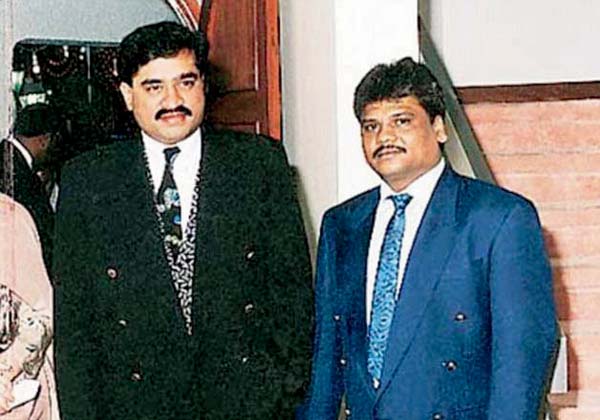
The decade saw Dawood Ibrahim's erstwhile crony, Chhota Rajan (right), rebel and form his own gang to challenge Dawood's clout
The first time the line was crossed was when Amirzada from the Pathan gang, which dominated South Mumbai, was killed in 1983 at the City Civil and Sessions Court by Dawood's gunman. But even this episode was dismissed by the police as a one-off act of impertinence.
The '90s, however, changed the equation between the police and the mafia. The first major act of impudence was the storming of JJ Hospital in September 1992. It was the desperadoes from the Dawood gang, who had sworn to kill gangster Arun Gawli's two henchmen for killing Dawood's brother-in-law, Ibrahim Parkar, a couple of months ago. The police would have dubbed it internecine mafia warfare had a police officer and constable not been killed in the shootout. The death of their own saw the police make several arrests, including a mayor from Bhiwandi whose official car was used as a getaway vehicle. Investigations revealed the deep-rooted mafia-politico nexus.
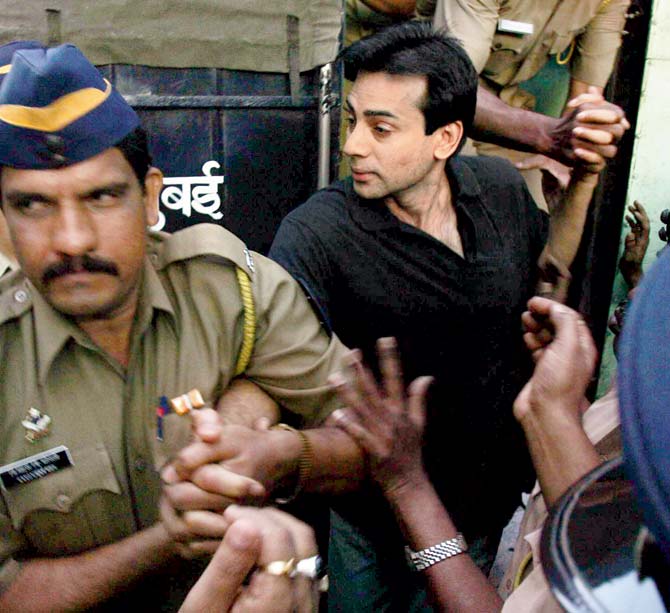
The '90s saw the rise of the minions, with Abu Salem (above) and Chhota Shakeel, taking over the D gang. Pic/Getty Images
But, the police continued to be stymied in their retaliation against the Dawood gang due to his proximity with ministers of the Union cabinet and politicians in the state government. As the police were struggling to circumvent Dawood's political hold, the country's communal climate hit a rough patch with the demolition of the Babri Masjid in Ayodhya in 1992. The priority of law enforcers changed to putting a stop to communal bloodshed. The Dawood mission was put on the backburner, and this proved costly for the police because within months, Dawood's landing spots and men were used to bring in arms and explosives into Raigad to orchestrate the biggest terrorist act in India's history until then. The serial bomb blasts of March 1993 - a timed-series of 10 blasts and two grenade attacks in landmark spots - proved to be the biggest stigma for the Mumbai police.
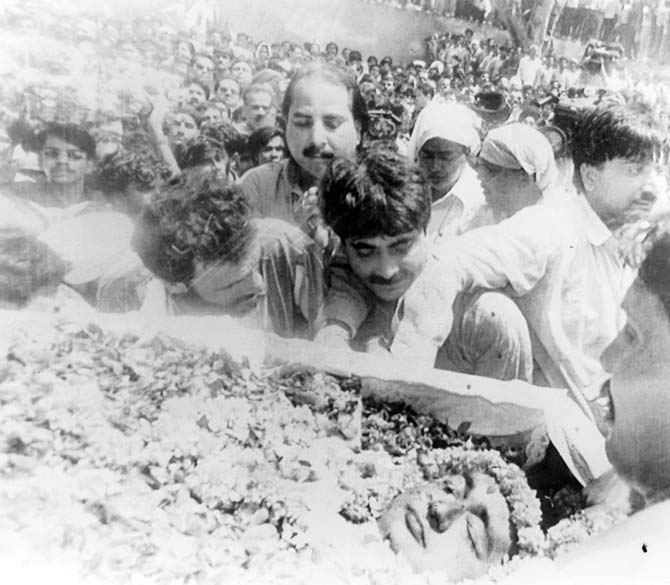
On August 12, 1997, Abu Salem got music mogul Gulshan Kumar shot in broad daylight outside a temple in Andheri. The cold-blooded murder fired the Mumbai police force to unofficially form the P Gang and take on the mafia. Pic/midday archives
Now, Dawood was the police's priority. Despite lack of evidence, he was charged as accused No. 1 in the blasts. Dawood outwitted the prosecution and offered to surrender, return to India and clear his name from the act of terrorism. But, his return would have opened a can of worms for politicians, too. So, the offer was nixed. He moved to Karachi from Dubai, and prepared to try his luck another day.
His erstwhile crony, Chhota Rajan rebelled and formed his own gang. It was the rise of the minions. Rajan became a ganglord operating from South-East Asian cities, while Chhota Shakeel and Abu Salem took over the reins of the D gang. The subsequent feud between the two Chhotas - Rajan and Shakeel - led to mayhem and murders. Several top businessmen were killed, including builder Omprakash Kukreja, and airline tycoon Thakiyuddeen Wahid.
The police were only too pleased with the development. The gangsters were doing their dirty work for them. They chose to play fence sitter until minion-turned-ganglord Abu Salem decided to challenge the police by killing film and music moghul Gulshan Kumar. On August 12, 1997, when Salem's gunman accosted Kumar outside a temple in Andheri, the film fraternity was shaken to the core. Kumar was made to crawl through a public urinal while trying to save his life, while the shooter had connected a call to Salem on his mobile phone so that the Dubai-based ganglord could hear the anguished screams of a dying man.
Though the cops were caught napping, they swung into action with amazing alacrity. This time, they unofficially formed the P gang and their angels of death were called encounter specialists. They started off with Salem's hirelings, branched out into other gangs and finally breached a lot of boundaries and grey areas. The gangsters of course, were felled like trees.
Meanwhile, a different storm was brewing in their backyard. Mill worker-turned-don Arun Gawli had begun nursing political aspirations. His neophyte political baby, Akhil Bhartiya Sena (ABS), was giving nightmares to the police administration. Gawli had become a member of the legislative assembly (MLA) and managed to get a few corporators including his daughter, Geeta, into the civic corporation.
An ABS rally held in Kala Ghoda saw over 1.5 lakh participants, surprising the men in uniform. A joint commissioner of crime, while giving a speech at the Indo-American Society, confessed that his biggest fear was that Gawli would become home minister and they may have to salute a former ganglord. The police were distraught.
At this juncture, in October 1998, Shakeel's shooters killed Bharat Shah in broad daylight.
This was the proverbial final nail in the underworld's coffin. For the Mumbai police, Shah's killing was like Mumbai's 9/11.
"Osama had always been a problem for the United States, but the Twin Tower crash galvanised the administration into action and got them to the caves of Tora Bora in Afghanistan. For us, we realised that if we did not act now, the gangs would make us pee in our pants. We needed to sharpen our knives," said a crime branch officer.
The police broke all laws of conventional policing and began widespread wiretapping. This exposed the Dawood gang. They managed to hear a Sessions Court judge strike a bargain with Shakeel and a film producer friend of Bal Thackeray, negotiating a deal with film producers on behalf of Shakeel.
Armed with the stringent Maharashtra Control of Organised Crime Act (MCOCA), they gradually undermined Gawli's political ambitions and decimated the Shakeel and Salem gangs.
By the turn of the century, the mafia had got a bitter taste of its own medicine. "Whenever the police resolve to play the undertaker, the underworld will end up under the ground," said an officer.
As of today, Dawood has been declared a global terrorist by the US Treasury Department, Rajan is in Tihar Jail, Salem has been convicted fr the 1993 Mumbai blasts and Gawli is behind bars for killing a Shiv Sena leader. There is hardly anyone left to mess with the P Gang.
The writer is a senior journalist and author of seven non-fiction books on organised crime. His latest title, Dangerous Minds, is slated for release next month. He tweets @husainzaidi
 Subscribe today by clicking the link and stay updated with the latest news!" Click here!
Subscribe today by clicking the link and stay updated with the latest news!" Click here!










